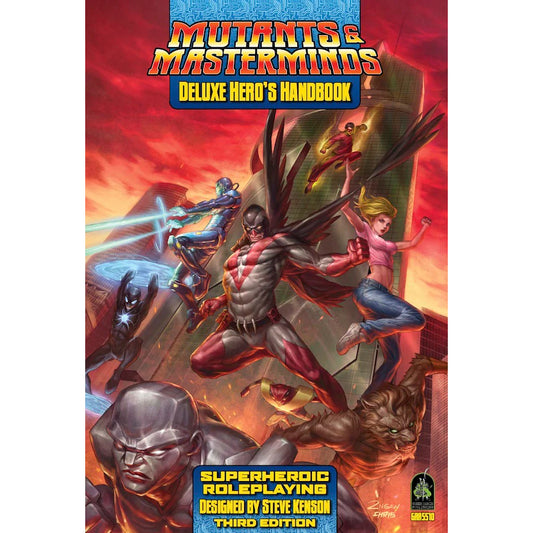Collection: Joe Carriker’s Top Five Green Ronin Picks!
Joe is a dev for Green Ronin, responsible for the Blue Rose AGE line, he has always worked on Fantasy AGE and the Critical Role: Tal'Dorei Campaign. Joe has had 18 years in the TTRPG industry. he is also a novelist, his first novel, Sacred Band, about a team of LGBTQ superheroes, garnering starred reviews from Kirkus Reviews and Publishers Weekly. His second novel, Shadowtide, is set in the Blue Rose setting and is available from Nisaba Press. Joseph lives in Portland, Oregon with his fiancé A.J.
-------------
Like other Ronins, I work at Green Ronin because I love what we do. So narrowing this list down to just five products? Not easy.
That said, here we go!
5. Ork! The Roleplaying Game, Second Edition
This updated version of the original Ork! is a glorious revisit of the sheer bonkers chaos of the original Ork! In this beer-and-pretzels game, you play…an ork. And it is your job to unleash all sorts of ork-like mayhem in the world. Being a systems wonk, though, it’s not (only) the premise that sells this for me, but the system that makes me love it.
Every check-in Ork! is an opposed roll. Sometimes against enemies, but quite often the roll is opposed by…well, by the ork god, who is a surly, ill-tempered sort of deity who delights in the suffering of his people. The sheer gonzo premise of a game system based on “God hates you and wants you to fail, except that you’re doing your best to spit in his eye” is absolute catnip for me.
4. Book of the Righteous
I’m a big Fifth Edition player, for starters. I am also a huge nerd when it comes to worldbuilding, and I find one of the best disciplines of worldbuilding to be the construction of pantheons, creation myths, and the forms of religion that populate a setting. The gods of a world say so much about that place, and how its people revere them adds to it.
For my money, the Book of the Righteous does the best job of addressing some of that style of worldbuilding in Fifth Edition material to date. Fully realized pantheons, religious orders, creation myths, and all the rest of it, with tons of player-facing mechanics (including a wealth of new cleric Domains and paladin Orders)? I’m so in.
3. Threefold
It is no secret that I love me some big universes. I'm a world-builder at heart, and I love sprawling, deeply interconnected, and flavorful settings with room to tell all kinds of interesting stories in. It's probably no wonder then that I love me some Threefold.A setting that includes organizations for player characters to belong to, each with specific goals and modes of operation. A theoretically infinite variety of worlds to explore, including a whole bevy of them right upfront, and potentially more to come? Alien tech and psychic abilities and weird history timelines? Seriously, this is exactly the kind of high-stakes rollicking adventure that I love, and developer Malcolm Sheppard has wrapped it all up in the extremely accessible Modern AGE system for me.
And uh you, too, of course. :)
2. Mutants & Masterminds Third Edition Deluxe Hero’s Handbook
Superhero RPGs and I go way back. During the Satanic Panic, my mom and pastor confiscated all my D&D goods to burn them. They left my Marvel Superheroes RPG stuff, assuming they were comics, and I kept right on gaming. If I have anything close to an Ultimate Universal System for my tastes, it’s probably M&M. It is very capable of doing superheroes, and a whole lot more. I’ve used it for cyberpunk, urban fantasy, and weird dimension-hopping type games, and I know folks who’ve used it for lots more. It is extremely flexible, but also easy to use.
Honestly, I just love using its system to build power sets. Mutants & Masterminds Third doesn’t present finished powers for you to use for your heroes. Instead, it presents an extremely exhaustive set of power effects. “What does this power do, mechanically?” the system asks, and encourages you to determine how it interacts with the rules. Does it do damage? Inflict penalties? Reduce an enemy’s power? Debuff with negative conditions? Once you figure that out, you can select the appropriate effects, slap a Descriptor (like Psychic, Magic, or Fire) onto it that describes what is responsible for those effects, and your power is ready to go.
The fact that you can play games that range in power from street-level shenanigans where a knee-breaker with a bat is dangerous all the way to hyper-dimensional cosmic epics is nothing short of incredible. Best still, both types of games are extremely playable, too – I sometimes brag that unlike some other games, Mutants & Mastermind’s “high level” games are perfectly playable and just as fun. I love the system so much, in fact, that when I was first putting together the main protagonists for my novel Sacred Band (available now from Nisaba Press), I built them using Mutants & Masterminds Third Edition rules! (You can get them here, for free, by the way.)
1. Blue Rose, Second Edition
I am the developer for the Blue Rose line at Green Ronin precisely because this book is in my number one spot. I didn’t contribute to this book myself, so I feel entirely justified in just how much of a ridiculous fanboy I am for this game. I did some writing for its first edition and fell in love then. Why?
Romantic fantasy is my jam, for starters. Fantasy that postulates magic that makes the world better and more accessible rather than more dangerous and more awful, narratives in which the people one meets and connects with are as important to the resolution as one’s skill with sword or spell, and a sense of egalitarian aspiration are all mixed together to form a sort of inspiring, uplifting fantasy that I just love. This edition of Blue Rose specifically is fantastic, as well, for its use of the AGE system. Stunts give exactly the sort of swashbuckling feel that should pervade these stories, and its magic system which allows the use of magic as long as one can resist the psychic exhaustion that comes of doing so is really enjoyable.
But anyone who knows me probably knows that I love this game because of how abundantly queer it is. Queerness is not an afterthought here – I commend a lot of games for their “well, nobody cares if you’re queer” approach to inclusion, but in Blue Rose queerness has impacted the culture and social identity of its people…in a good way. It also explicitly makes room for different types of queer characters, from those characters who have no idea what bigotry against them is (which can be very comforting to play for some queer gamers who don’t need marginalization in their gaming) to those whose heroism includes having come from very restrictive backgrounds and having fought their way to freedom (which can be a cathartic gaming experience for some queer folk as well).
Plus, honestly, the ability to play a sapient, psychic animal? Yes, please.
-
Blue Rose: The AGE RPG of Romantic Fantasy
Regular price $37.50 USDRegular priceUnit price / per$49.99 USDSale price $37.50 USDSale -
Mutants & Masterminds Deluxe Hero's Handbook (Print)
Regular price $49.95 USDRegular priceUnit price / per -
 Out of stock
Out of stockThe Book of the Righteous (5E Hardback)
Regular price $49.95 USDRegular priceUnit price / per$49.95 USDSale price $49.95 USDOut of stock -
Ork! The Roleplaying Game, Second Edition
Regular price $29.95 USDRegular priceUnit price / per$29.95 USDSale price $29.95 USD





